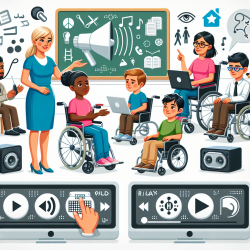Introduction
Neuropsychological assessment is a powerful tool in understanding and enhancing cognitive functioning. As highlighted in the research article "Clinical Applications of Neuropsychological Assessment," these assessments offer invaluable insights into cognitive consequences resulting from brain damage, disease, or severe mental illness. For practitioners in speech-language pathology, especially those working with children, integrating neuropsychological assessments into their practice can significantly enhance outcomes.
The Power of Neuropsychological Assessments
Neuropsychological assessments provide a performance-based method to evaluate cognitive functioning. They are particularly useful in examining cognitive consequences of various conditions and predicting functional potential and recovery. This is crucial in pediatric populations, where early identification of cognitive deficits can lead to timely interventions and improved developmental trajectories.
Applications in Pediatric Practice
For practitioners focused on child development, neuropsychological assessments can be a game-changer. Here’s how they can be applied effectively:
- Diagnostic Clarity: These assessments can help differentiate between various cognitive disorders, providing clarity in diagnosis and guiding targeted interventions.
- Tracking Development: By assessing cognitive abilities over time, practitioners can track developmental progress and adjust therapeutic strategies accordingly.
- Personalized Interventions: Understanding specific cognitive deficits allows for the customization of intervention plans, ensuring that each child receives support tailored to their unique needs.
Encouraging Further Research
While the current research underscores the utility of neuropsychological assessments, there is always room for further exploration. Practitioners are encouraged to engage in ongoing research to refine assessment tools and develop innovative intervention strategies. This commitment to continuous learning and adaptation is essential in a field as dynamic as child development.
Conclusion
Incorporating neuropsychological assessments into speech-language pathology practices can significantly enhance outcomes for children. By leveraging these assessments, practitioners can make data-driven decisions that lead to transformative changes in cognitive and functional development. As we continue to explore and understand the complexities of cognitive functioning, these assessments will remain a cornerstone in creating better futures for children.
To read the original research paper, please follow this link: Clinical applications of neuropsychological assessment.










